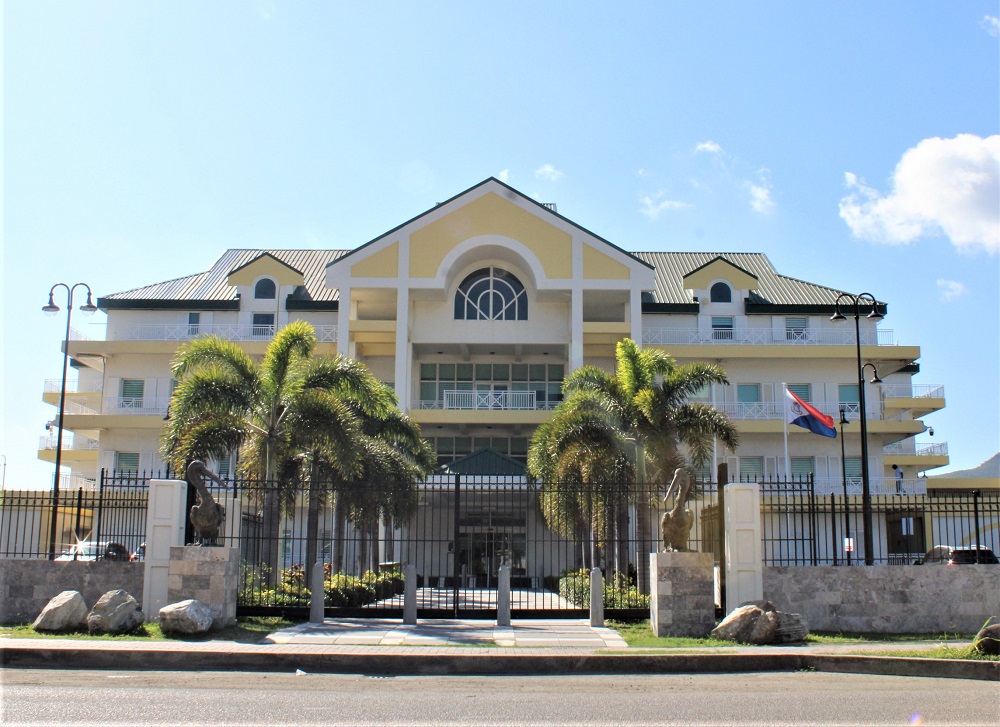Execution country packages encounters ups and downs

PHILIPSBURG — St Maarten has achieved ‘beautiful results” Prime Minister Silveria Jacobs wrote in a reaction to the fourth progress report from the Temporary Work Organization (TWO) about the implementation of measures outlined in the country packages. But there are also setbacks: “Capacity issues will remain a returning issue in progress reports,” Jacobs noted.
The report acknowledges that insufficient progress cannot always be attributed to the country. To bring short-term measures that serve long-term objectives into focus, the TWO introduced St. Maarten to the Theory of Change.
The late Carol Weiss, an American sociologist who died in 2013 at the age of 86, is credited with coining the term Theory of Change. In 1995 she published a book entitled New Approaches to Evaluating Comprehensive Community Initiatives. She was a member of the Aspen Institute’s Roundtable steering committee on evaluation.
The key to the Theory of Change-concept is that assumptions that inspire complex programs (such as the implementation of St. Maarten’s country package) are difficult to evaluate because they are so poorly articulated.
The Theory of Change-sessions that were held during two weeks in St. Maarten aimed to put a dot on the horizon and to define a clear roadmap and associated actions. The report states that the Theory of Change-roadmap for financial management has already been established.
In the field of fiscal reform there is an agreement about editorial adjustments and corrections to existing fiscal ordinances.
The first measures to combat illegal employment have been implemented and there is now concept legislation for games of chance.
The TWO-report notes that there is “good progress with many measures” and that the cooperation with St. Maarten is “constructive.”
However, the report also asks attention for what it calls capacity-challenges. The limited capacity at the Department for Fiscal Affairs (Afdeling Fiscale Zaken or AFZ), which is involved in the reform of the country’s fiscal system, is causing problems. “The reform-project threatens to get stuck because there is insufficient capacity available for the valuable and necessary review of AFZ-concepts.”
Measures related to strategic staffing policies and strengthening of the Human Resources function also encounter delays. “This impasse is caused by a difference of opinion about clarifying the division of roles between the top of the civil service and management.” Parties reached an agreement about this issue in the month of August.
On the upside, the report states that the implementation of a general health insurance per January 1, 2024, is feasible. “Unfortunately VSA (the Ministry of Public Health, Social Development and Labor) has trouble sticking to agreements. There is a lack of capacity but the question is also whether the available capacity is being used efficiently.”
Measures to increase the sustainability of the healthcare system have encountered “unnecessary delays for three-quarters of a year,” the report states. A simple progress report about the way the TWO spends its budget is not forthcoming either.
Capacity shortages at the ministry of justice are causing delays in the progress with the management and supervision of the Crime Fund and with agreements that St. Maarten will abide by CFATF-guidelines for combating fraud and money laundering.
The draft policy plan for the Crime Fund is ready but it has not been established yet. There is also a Crime Fund manual. The establishment of a Crime Fighting Steering Group is delayed because no candidates have been selected for this function yet.
The agreement with UNOPS (the United Nations Office for Project Services) for the construction of the new prison encountered delays “due to a lack of feedback from St. Maarten.”
In November negotiations took place about a fiscal agreement between the Netherlands and St. Maarten. This agreement focuses on the minimum Base Erosion Profit Shifting conditions that aim to prevent attempts to move profits to a different jurisdiction.
Part of the country package is also research into the cost of an independent (local) currency versus dollarization. The International Monetary fund (IMF) has researched dollarization and the Central Bank of Curacao and St. Maarten has analyzed how the disadvantages of having a local currency can be approached.
Regarding the gambling sector the TWO is still waiting for St. Maarten’s view on the organizational structure for a local Gaming Authority. Gaming Laboratories International has done a technical audit of gaming machines, a project that is supposed to be completed by the end of this year.
Measures to improve detention conditions encounter delays as well. St. Maarten has asked to postpone the deadline for this project until June 30, 2023. The implementation of function manuals has not been realized yet and the tender for architectural improvements has not been granted yet either.
###
Related articles:
Agreement for New Prison signed between Sint Maarten and UNOPS
Governor requires total sum calculation prior to signing Legal Position Regulation


























